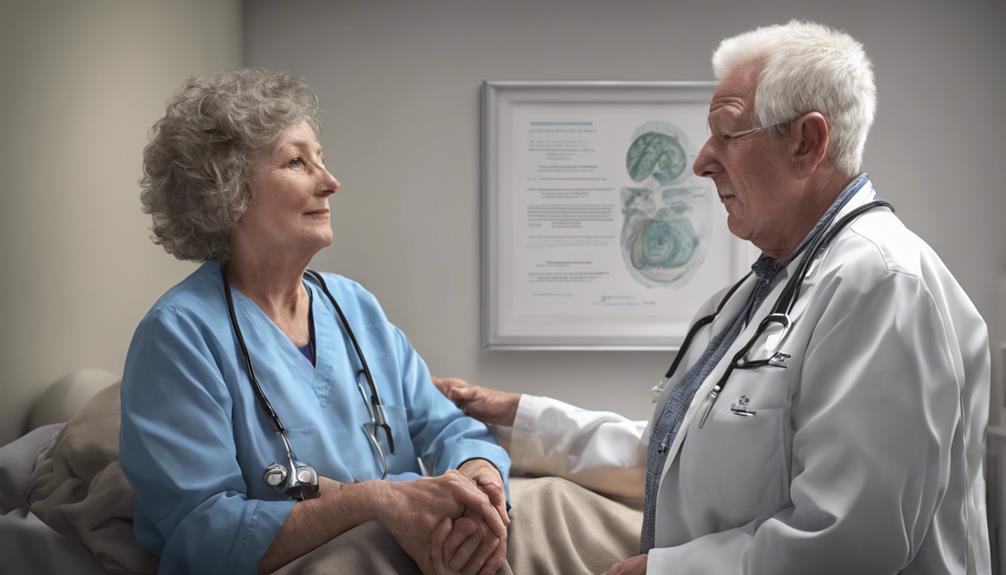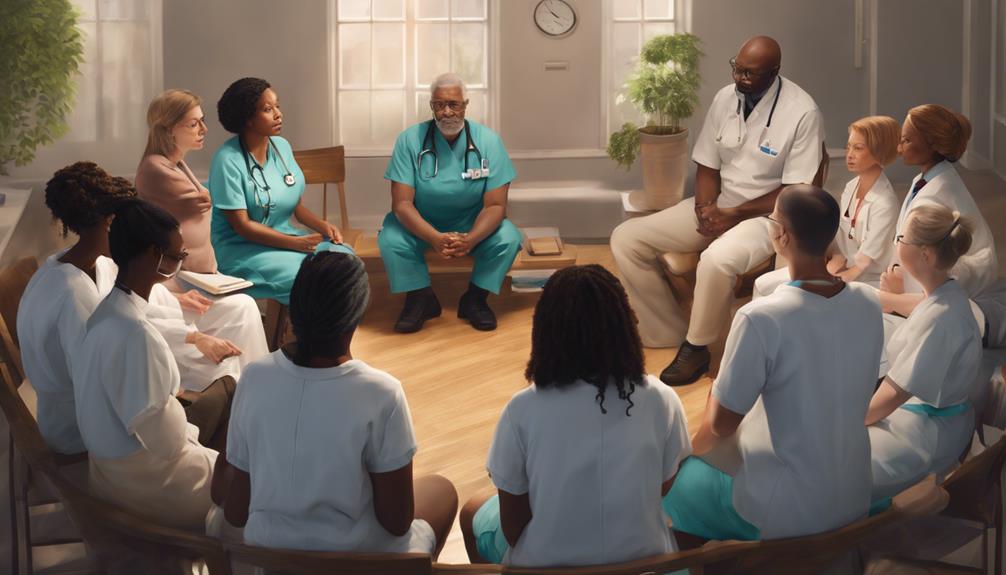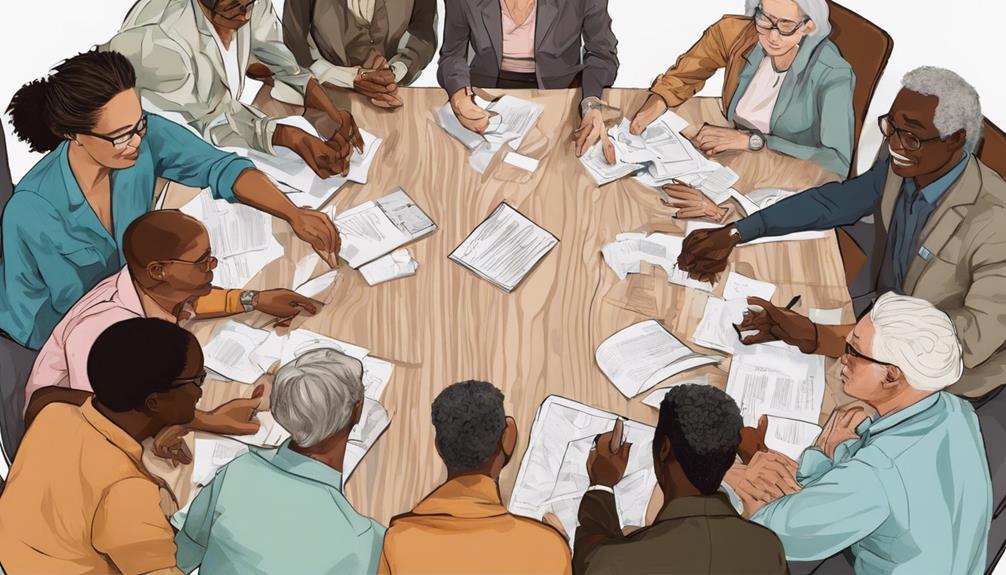We will discuss the contribution of Pat Deegan RN in helping us comprehend advanced directives. Pat Deegan is an expert in mental health and she emphasizes the importance of advanced directives. Through advanced directives, we can communicate medical preferences and maintain control over healthcare decisions. This is crucial for patient autonomy. Education on legal documents such as healthcare proxies and living wills enables us to make informed choices regarding medical care. Understanding advanced directives is key to developing personalized care plans. These directives empower individuals to have a say in their healthcare decisions. To delve deeper into the role of Pat Deegan RN, continue exploring.
Key Takeaways
- Pat Deegan RN advocates for patient empowerment and understanding of advanced directives.
- She promotes the importance of expressing medical preferences and ensuring patient autonomy.
- Deegan emphasizes educating patients on healthcare proxies and living wills for informed decision-making.
- Her work supports personalized care plans and recovery-oriented approaches in healthcare.
- Deegan's role involves translating materials, raising awareness, and advocating for patient rights.
Pat Deegan RN: Background and Expertise
In the mental health recovery domain, Pat Deegan RN stands out as a thought leader with a personal journey of overcoming schizophrenia and advocating for others' empowerment. Diagnosed with schizophrenia as a teenager, she's devoted her life to supporting individuals in their mental health recovery journeys. Deegan's dedication led her to establish the M-POWER organization for wellness empowerment and co-found the National Empowerment Center, both aimed at promoting mental health recovery.
Her work emphasizes collective recovery and inclusivity by translating materials into multiple languages to reach a broader audience. Through her innovative approaches, Deegan has received numerous awards recognizing her significant contributions to the mental health field and her unwavering commitment to peer support. Her experiences and expertise make her a valuable resource for anyone seeking guidance and inspiration in the field of mental health recovery.
Pat Deegan RN's impact on the mental health recovery community highlights the importance of empowerment and advocacy in the journey towards wellness.
Importance of Advanced Directives

Emphasizing the essential role of advanced directives in healthcare planning, individuals can clearly express their medical preferences to ensure their wishes are respected in critical situations. Advanced directives, such as living wills and healthcare proxies, play a pivotal role in guaranteeing that patients' preferences for medical treatment are honored, especially in decision-making scenarios where they may be unable to communicate their wishes. By completing these legal documents, individuals can take a proactive approach to their healthcare, promoting autonomy and self-determination even in challenging circumstances. Embracing recovery-oriented approaches, advanced directives empower individuals to advocate for their own well-being and align their care with their values and goals.
| Benefits of Advanced Directives | Description |
|---|---|
| Ensures Patient Autonomy | Allows individuals to make decisions about their own medical care even if they can't communicate. |
| Reduces Stress for Patients and Caregivers | Provides clear guidance on medical treatment preferences, reducing uncertainty in critical situations. |
| Facilitates Informed Decision-Making | Guides healthcare decisions based on the patient's expressed wishes, promoting personalized care. |
| Supports Recovery-Oriented Approaches | Empowers individuals to actively participate in their healthcare planning, promoting holistic well-being. |
Empowering Patients Through Education
Continuing our exploration of advanced directives, we zone in on 'Empowering Patients Through Education' to illuminate how understanding these directives can revolutionize healthcare decision-making for individuals.
Pat Deegan RN plays an essential role in empowering patients by educating them on the significance of advanced directives. Through her guidance, patients learn about appointing a healthcare proxy and creating a living will, which are pivotal components in ensuring their end-of-life wishes are respected.
By promoting awareness and understanding of advanced directives, patients can make informed decisions about their medical treatment preferences, reducing stress and uncertainty for both themselves and their caregivers. This education not only enhances patients' ability to advocate for their own care but also contributes to their overall recovery process.
Understanding advanced directives empowers patients to take control of their healthcare decisions, leading to more personalized and dignified end-of-life care. By outlining their preferences through living wills or healthcare proxies, individuals ensure their wishes are respected even when they are unable to communicate them. This proactive approach can also alleviate the emotional burden on families, who may otherwise be left to make difficult decisions during a time of immense stress and uncertainty. In some cases, disenfranchised grief explained as grief not openly acknowledged or socially supported, may arise in these situations, especially when family members’ choices conflict with established directives.
Advocacy for Rights and Preferences

We must understand that advocating for rights and preferences in healthcare is essential. Patients have the right to express their preferences and make choices about their care.
Advocating for patients guarantees that their wishes are respected and honored in all medical decisions.
Rights and Autonomy
How can individuals ensure that their rights and preferences are respected in healthcare decision-making? When it comes to mental health services, ensuring rights and autonomy is essential. Here are some ways to advocate for rights and preferences:
- Be informed: Educate yourself about your rights and the options available.
- Communicate openly: Clearly express your preferences and concerns to your healthcare providers.
- Seek support: Don't hesitate to involve a trusted advocate or support person in decision-making.
- Review and update: Regularly review and update your advanced directives to guarantee they reflect your current wishes.
Preferences and Choices
Advocating for our rights and preferences in healthcare decision-making is essential for ensuring our autonomy and well-being. When it comes to healthcare choices, our preferences play a vital role in guiding the care we receive. Understanding and expressing our preferences can help healthcare providers tailor treatments to align with our desires. Below is a table illustrating how preferences can influence decision-making in healthcare:
| Preference | Influence on Decision-making | Outcome |
|---|---|---|
| Treatment options | Directs choice of care | Personalized care plan |
| End-of-life wishes | Guides decision-making in critical times | Peaceful and dignified passing |
| Communication style | Enhances patient-provider interactions | Improved understanding and trust |
Advocacy for Patients
Highlighting the significance of patients' rights and preferences in healthcare decision-making, Pat Deegan RN advocates for respectful and informed advanced directives. As we explore the realm of advocacy for patients, we see how essential it's to guarantee that individuals have a voice in their care.
- Patient advocacy involves advocating for the rights and choices of individuals.
- It involves promoting open and honest communication between all parties involved in the care process.
- Advocates like Deegan work to empower patients to make well-informed decisions about their healthcare.
- Upholding patient-centered care is a fundamental ethical responsibility in healthcare settings.
Autonomy in Healthcare Decision Making

Autonomy in healthcare decision making grants individuals the right to control their medical care choices. It means that you have the power to make decisions about your health, treatments, and future care. When it comes to healthcare, you have the right to say what you want and what you don't want.
Advanced directives are important because they give you a way to keep control over your healthcare decisions, even if you can't communicate your wishes in the future. By creating advanced directives, you can make sure that your values and preferences are known and respected.
This is pivotal because autonomy in healthcare decision making guarantees that your voice is heard and your wishes are followed by healthcare providers. It's about making sure that you're at the center of your healthcare decisions, with your choices and beliefs guiding the care you receive.
Respecting Individual Voices

In healthcare decision making, our individual voices hold paramount importance, particularly when it comes to end-of-life care planning. When considering advanced directives, it's essential to respect and uphold the preferences and values of each person, ensuring their wishes are honored.
To effectively respect individual voices in the mental health system, we must:
- Encourage Open Communication: Foster an environment where individuals feel comfortable expressing their desires and concerns regarding their end-of-life care.
- Value Personal Autonomy: Recognize and uphold each person's right to make decisions about their own healthcare, including advanced directives.
- Promote Dignity: Treat every individual with respect and dignity, acknowledging the importance of their choices in the decision-making process.
- Empower Informed Decision Making: Provide the necessary information and support for individuals to make well-informed choices aligned with their values and beliefs.
Challenges in Implementing Advanced Directives

When it comes to implementing advanced directives, we often face legal obstacles that can complicate the process. Additionally, communication barriers between patients and their families can create further challenges in ensuring the directives are followed accurately.
Understanding these hurdles is important to maneuvering the complexities of advanced directives effectively.
Legal Hurdles in Implementation
Traversing the maze of varying state laws and regulations presents significant challenges when implementing advanced directives. Legal hurdles can complicate the process, requiring careful navigation to guarantee compliance and effectiveness. Some key obstacles include:
- Varying legal requirements across states
- Confusion and inconsistencies in implementation
- Securing proper execution and meeting legal standards
- Impact on validity and enforceability
Understanding these challenges is essential for healthcare professionals to successfully assist individuals, especially those with serious mental illnesses, in creating advanced directives that align with their wishes and comply with the law. By being aware of these legal complexities, professionals can better support patients in making informed decisions about their healthcare preferences.
Patient-Family Communication Barriers
What communication barriers arise between patients and their families when implementing advanced directives?
Misunderstandings and lack of clarity during family discussions can hinder the process. Family dynamics and conflicts may impede effective communication about end-of-life preferences. Cultural differences and beliefs within families can create barriers to openly discussing advanced directives.
Additionally, lack of education and awareness about the importance of advanced directives can lead to resistance in family conversations. Emotional stress and denial within families can make it challenging to address and follow through on these discussions.
Overcoming these barriers requires fostering social inclusion, understanding diverse perspectives, and promoting open dialogue within families to make sure that everyone's wishes are respected and honored.
Future of Advanced Directives

As advanced directives continue to evolve, they're integrating digital platforms to enhance accessibility and ease of updating. Online tools and apps are being developed to streamline the creation and management of advanced directives. The future of advanced directives includes advancements in technology to guarantee widespread accessibility and convenience. Electronic health records integration aims to improve healthcare provider access to patients' advanced directives. Telehealth services are being utilized to facilitate discussions and documentation of advanced directives remotely.
In this digital age, the future of advanced directives holds exciting possibilities for ensuring that your healthcare wishes are known and honored. By leveraging technology, advanced directives can now be easily created, updated, and accessed whenever needed. These advancements not only improve the quality of life for individuals by empowering them to make informed healthcare decisions but also facilitate smoother communication with healthcare providers. Embracing these digital tools can help you take control of your healthcare journey and guarantee that your preferences are respected.
Frequently Asked Questions
How Can Healthcare Providers Effectively Communicate the Importance of Advanced Directives to Patients With Limited Health Literacy?
We focus on simplifying intricate ideas for patients with limited health literacy. We actively engage, educate, and empower individuals to understand the importance of advanced directives. Building trust and offering support guarantees effective communication and informed decision-making.
What Strategies Can Be Employed to Ensure That Patients From Diverse Cultural Backgrounds Feel Empowered and Informed When Making Decisions About Their Healthcare Preferences?
When ensuring patients from diverse backgrounds feel empowered in healthcare decisions, we embrace cultural stories like guiding stars, illuminating paths. Listening, respecting, and explaining options in ways that honor differences fosters trust and shared understanding.
How Can Healthcare Organizations Overcome Resistance From Providers Who May Be Reluctant to Incorporate Advanced Directives Into Their Practice?
To overcome provider resistance in incorporating advanced directives, we focus on education, open dialogue, and highlighting the benefits for both patients and providers. By fostering a culture of understanding and support, we can guarantee thorough and compassionate care.
What Role Do Family Members or Loved Ones Play in Supporting a Patient's Autonomy in Healthcare Decision Making, Especially in Cases Where the Patient May Lack Capacity?
Like a guiding light in a storm, family members or loved ones serve as beacons of support for patients facing healthcare decisions without capacity. They uphold autonomy, provide comfort, and make certain the patient's wishes are honored.
Are There Any Current Legislative Efforts or Policies Being Considered That Aim to Improve the Implementation and Utilization of Advanced Directives in Healthcare Settings?
We're actively exploring legislative efforts and policies to enhance the implementation of advanced directives in healthcare settings. Our focus is on improving utilization, ensuring patient autonomy, and facilitating informed decision-making processes for all individuals.
Conclusion
To sum up, grasping advanced directives with the guidance of Pat Deegan RN is vital for ensuring our voices are heard in healthcare decisions. By empowering ourselves with knowledge, we can advocate for our rights and preferences, ultimately leading to autonomy in our medical care.
Despite challenges, the future of advanced directives looks promising with the continued support of experts like Pat Deegan RN. Let's take charge of our health and make our voices heard.









